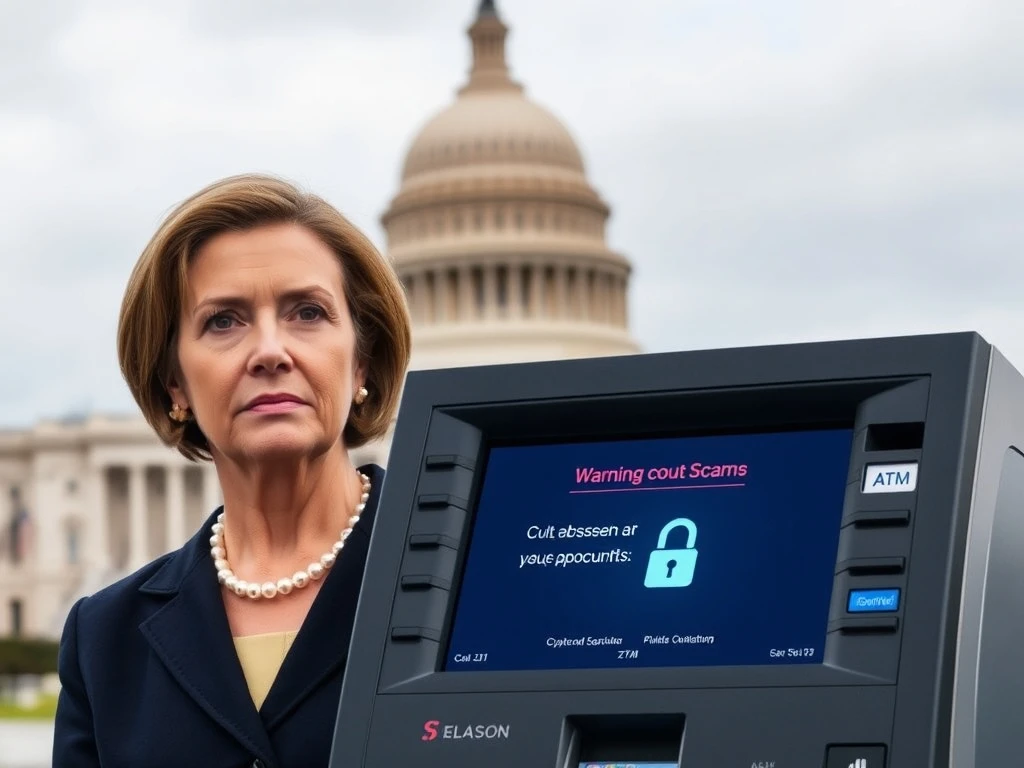Urgent Action: Senator Lummis Targets Crypto ATM Scams with Sweeping Market Structure Bill

The rising tide of crypto ATM scams is prompting urgent legislative action. Senator Cynthia Lummis is at the forefront of this fight. She believes a new market structure bill could significantly address these pervasive frauds. This development comes as the US Senate Banking Committee prepares for a crucial vote on digital asset market structure legislation. Furthermore, this bill aims to establish clearer rules for the cryptocurrency industry.
Senator Lummis Champions Market Structure Bill to Combat Crypto ATM Scams
Senator Cynthia Lummis (R-Wyo.) has highlighted a critical issue. She points to the widespread fraud involving Bitcoin (BTC) ATMs. In a recent social media post, Senator Lummis confirmed that she and Senator Kirsten Gillibrand (D-N.Y.) intend to tackle these scams through their proposed market structure bill. This legislative effort is a direct response to alarming reports. For example, the Cheyenne police department identified 50 instances of fraud. These cases predominantly affected seniors via crypto ATMs. The total losses exceeded $645,000.
“We hope to address in market structure instances of fraud involving Bitcoin (BTC) ATMs,” Senator Lummis stated. This indicates a strong commitment to consumer protection. Currently, no federal law specifically targets crypto ATM fraud. The Federal Bureau of Investigation (FBI) reported concerning statistics. In 2024 alone, the FBI received approximately 11,000 complaints. These complaints related to fraud cases at crypto kiosks. This resulted in over $246 million in losses. Clearly, the need for robust cryptocurrency regulation is pressing.
The Urgent Need for Cryptocurrency Regulation and Digital Asset Legislation
The Senate Banking Committee, where Senator Lummis holds a seat, is expected to vote soon. This vote concerns a bill designed to establish clear rules. These rules will govern digital asset regulation and cryptocurrency companies in the US. Senator Lummis expressed optimism for the bill’s passage. She hopes it will be signed into law by 2026. This would mark a significant step forward for the industry.
Meanwhile, the US House of Representatives passed its version of market structure legislation. This bill, known as the CLARITY Act, passed in July. However, its final text did not explicitly mention crypto ATMs. It did allude to exchanges developing “automated systems in accordance with industry standards.” The latest Senate draft bill, released by Republican leadership in September, also lacked specific mentions of crypto kiosks or ATMs. This suggests that the Senate’s version remains adaptable. Senator Lummis’s recent remarks further confirm this flexibility. She signaled that the bill’s text could still evolve. This is good news for those hoping to include explicit protections against crypto ATM scams.
Industry stakeholders are closely monitoring Congress. They seek updates on market structure. Last week, congressional members met with various industry executives. They discussed upcoming legislation. This included both the market structure bill and a proposal for a national crypto reserve. The reserve could hold up to 1 million BTC. These discussions highlight the growing importance of comprehensive digital asset legislation.
Past and Present Federal Efforts to Address Crypto ATM Fraud
This is not the first attempt at federal intervention. In February, Senator Dick Durbin (D-Ill.) introduced the Crypto ATM Fraud Prevention Act. He aimed to address an “alarming trend of crypto ATM fraud.” His bill proposed specific requirements. It would mandate ATM operators to:
- Warn consumers about potential scams.
- Implement reasonable steps to prevent fraud at their machines.
This bill was referred to the Senate Banking Committee. However, it did not advance for a floor vote. This underscores the challenges of passing such legislation. It also emphasizes the ongoing need for a comprehensive market structure bill.
The lack of federal clarity has created a patchwork of regulations. Different states and cities have taken matters into their own hands. They are addressing crypto ATM scams locally. For example:
- Stillwater, Minnesota, and Spokane, Washington, banned crypto kiosks and ATMs. This was a direct response to increased scam activities.
- Grosse Pointe Farms, Michigan, preemptively imposed a $1,000 daily transaction limit. This applied to crypto kiosks, even before any were installed.
By August, 13 US state governments had enacted laws. These laws restrict crypto ATM activities. They include provisions for:
- Daily transaction limits.
- Refunds for defrauded individuals.
- Prominently displayed warnings on kiosks.
- Mandatory registration with state authorities.
These local actions demonstrate the urgent need for consistent, nationwide cryptocurrency regulation.
Looking Ahead: The Future of Crypto ATM Security and Digital Asset Legislation
The ongoing legislative efforts are crucial. They aim to create a safer environment for digital asset users. The proposed market structure bill, championed by Senator Cynthia Lummis, represents a significant opportunity. It can standardize protections across the country. This will help mitigate the risks associated with crypto ATM scams. Effective digital asset legislation will foster greater trust. It will also promote responsible innovation within the cryptocurrency space. Consumers deserve clear protections. The industry needs predictable rules. This bill seeks to deliver both, paving the way for a more secure crypto future.
Editor’s Choice E*Trade to add Bitcoin, Ether, Solana in Morgan Stanley’s crypto expansion Bitcoin dips entice buyers, but charts warn of BTC price purge to $106K XRP ETF pump ‘disappointment,’ Bitcoin to see out 2025 at $173K: Trade Secrets Are TGEs becoming the end of blockchains? Blockchain networks will stop crypto deepfake scams Advertise with us










